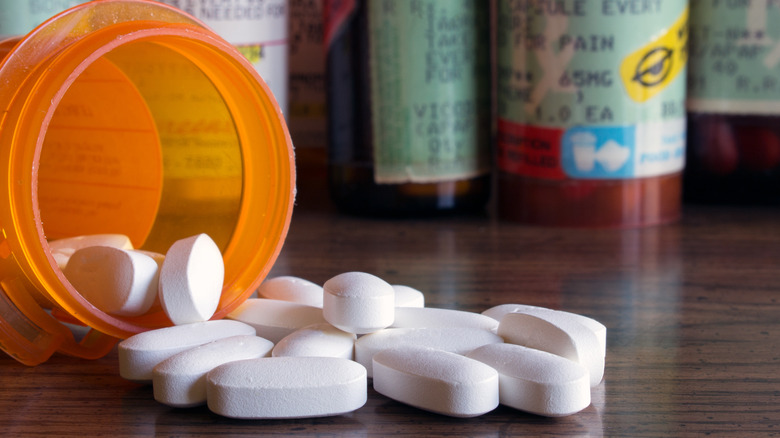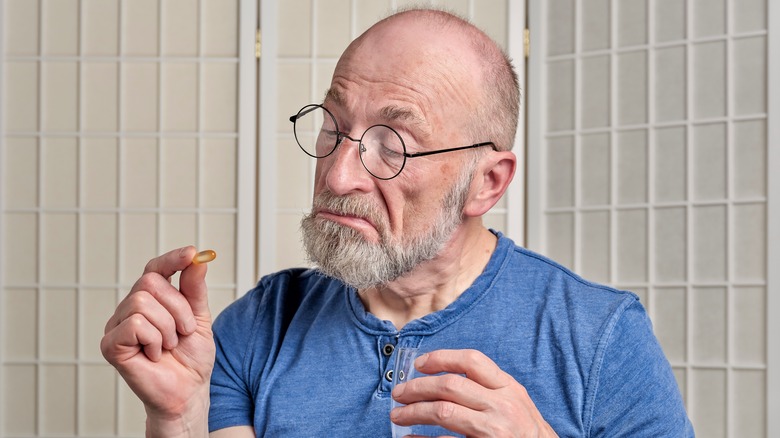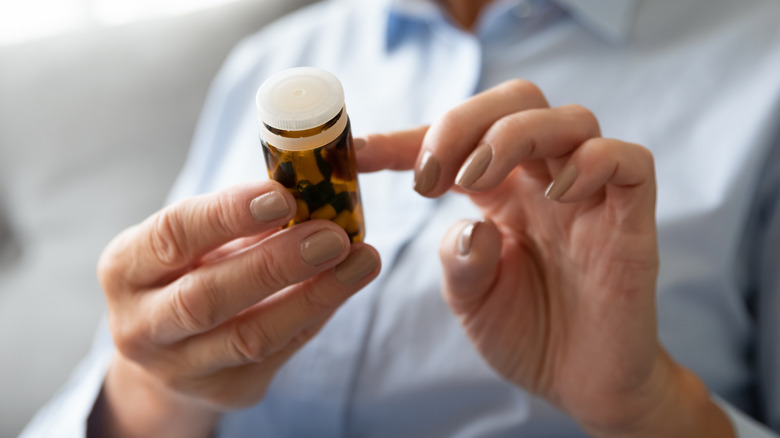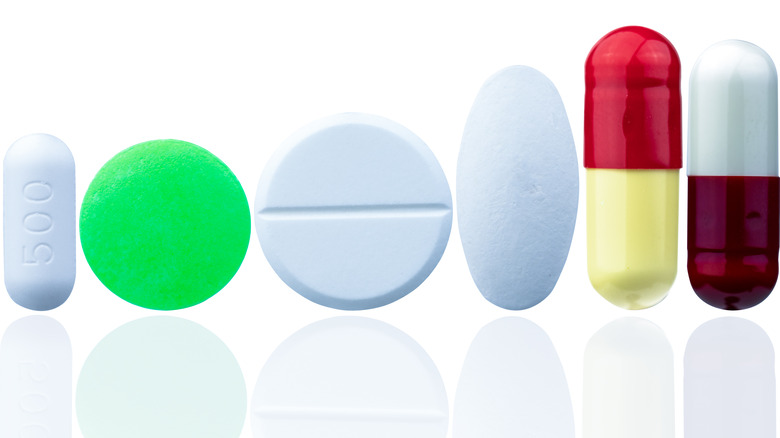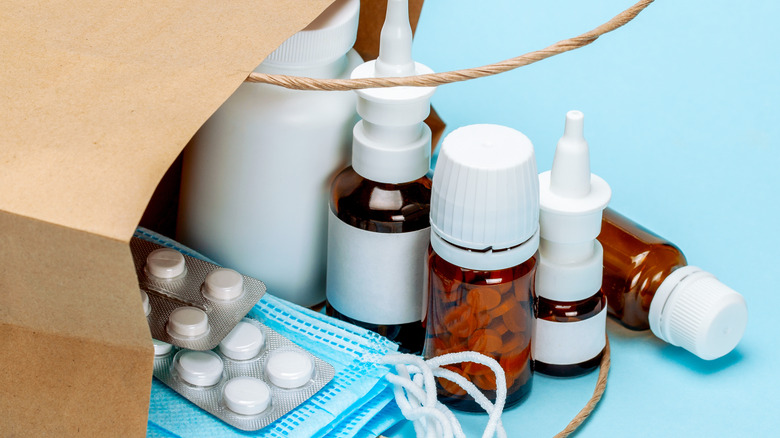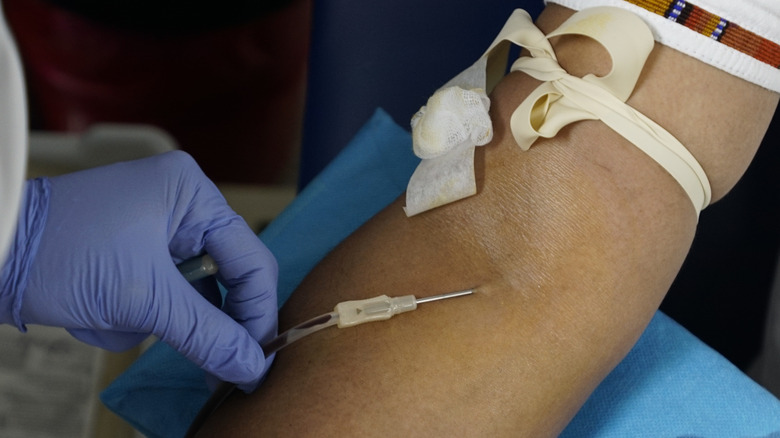Questions You Should Always Ask Before Starting A New Prescription Medication
It happens to everyone at some point. You see a medical professional for a health issue, and they hand you a tiny, hard-to-read piece of paper. Someone in scrubs quickly tries to explain it while you're getting ready to head out. However, brain fog from your illness or general lack of knowledge of medical terms has left you perplexed.
You've been given a prescription for medication. Nemours KidsHealth defines medicines as "chemicals or compounds used to cure, halt, or prevent disease; ease symptoms; or help in the diagnosis of illnesses." In other words, hopefully, this drug will help you feel better.
Of the almost 200 million Americans who use prescription drugs, 1.5% present with a severe reaction, and just under 330,000 people in America and Europe combined die due to use of medication. That is why it's essential to speak with your prescriber and ask questions. Most issues occur due to a lack of communication. It could be a misunderstanding between you and the doctor, or between the doctor and the pharmacy. Either way, being informed is the best way to avoid potential medical issues.
What is the exact name of the drug?
Knowing the exact name of the medication you are prescribed is vital to ensure you get the correct drug from your pharmacist. While drug names must be one-of-a-kind to try and prevent problems, issues often arise for a few reasons. In some cases, multiple drug names are quite similar to each other, either visually (due to how they are spelled) or in the way they sound — for instance, The Institute for Safe Medication Practices (ISMP) released an eight-page list of drugs with similar names that caused problems. In addition, the World Health Organization (WHO) states, "contributing to this confusion are illegible handwriting, incomplete knowledge of drug names, newly available products, similar packaging or labeling, similar clinical use, similar strengths, dosage forms, frequency of administration, and the failure of manufacturers and regulatory authorities to recognize the potential for error and to conduct rigorous risk assessments."
Why am I being prescribed this medication?
The main reasons that doctors and other healthcare practitioners prescribe medications is to treat your symptoms and to help you manage or overcome certain health conditions (via Healthcare Associates Of Texas). Immunizations, often given as shots, help to keep you healthy (via Nemours KidsHealth). Antibiotics help your body fight off illnesses that do get into your body. Pain relievers help you feel better, while other medicines enable your body to keep chronic sicknesses and their side effects in check.
Over 10% of the adults in the U.S. take more than five prescriptions daily — quite a bit to keep track of (via CDC). And some of these people may be unsure as to why they need to take some of the medication they're given (via U.S. Pharmacist). Others have drugs with complicated directions. The problems that result from confusion over prescribed medications are responsible for 30% of all hospital admissions and are the fifth leading cause of death.
How exactly do I take it?
While the most common ways to take prescription medication is by swallowing a pill or drinking a liquid, Healthline lists 16 different ways that drugs can be administered. Some medicines are best inhaled, while others work best when applied to your skin. Still others need to go directly into your blood stream through an IV or an injection. How it gets into your body depends on what part of your body needs the medicine, the drug's chemical makeup, and how it works once it enters the body. If there's a potential that the acids in your stomach will make it useless, the doctor may give it to you as an injection.
If you're self-administering your medication, following the instructions is key (via FDA). However, patients aren't perfect. Many fail to follow the directions due to forgetfulness, unclear instructions, too many medications, cost, side effects, or because their symptoms fail to improve promptly and they give up. Indeed, the CDC states that as many as half of medications that are filled aren't taken correctly. But as the FDA reminds patients, "to help you get the best results from your medications, taking your medicine as instructed is very important."
Are there side effects?
The FDA does extensive testing to ensure that all medications, both over-the-counter and prescribed, are more beneficial than dangerous. That being said, there are risks to starting, stopping, or changing the dosage of the drugs you take, even if your doctor tells you to do so. Your body could react in unpleasant ways. Also referred to as adverse reactions, the FDA defines side effects as "unwanted undesirable effects that are possibly related to a drug. Side effects can vary from minor problems like a runny nose to life-threatening events, such as a heart attack or liver damage."
Some more common side effects include stomach issues like nausea and diarrhea, as well as drowsiness, dizziness, and mood swings (via Medical News Today). Allergic reactions like rashes, breathing difficulties, and swelling can also occur and require immediate medical attention.
The best way to reduce the uncomfortable possibility of side effects is with information. Be sure to ask your doctor and pharmacist about known side effects to your prescribed drug. You can also go online and research the specific medication (via FDALabel). Finally, if you experience discomfort from a change in medication, report it to your doctor.
Should I be concerned about drug interactions?
The Centers for Disease Control and Prevention (CDC) reports that nearly half of the population has taken at least one prescribed medication in the last month. Of those, one-quarter took at least three prescriptions. Those taking more than one medication — or whose health routine includes vitamins, supplements, herbs, or over-the-counter (OTC) drugs — may need to take particular care to avoid drug interactions.
Drug interactions result when a medicine mixes with something else — another medication, food or drink you've consumed, supplements or vitamins you may have taken, etc. — and this changes how your medication impacts your body (via Healthline). There are several different types of drug interactions (via the FDA). For example, drugs can adversely interact with other medications (both prescribed and OTC), food (and alcohol), or due to other medical issues you may have. They can also change the results of some laboratory tests. Genetics, weight, age, and whether you are biologically male or female also play a role in drug interaction development (via Healthline). Other factors include lifestyle and diet choices, the order in which you take your medications, and the amount of the drug in your system.
The best way to avoid drug interactions is to be educated and honest with your doctors and pharmacists. If you see more than one doctor or fill your prescriptions at more than one pharmacy, inform the people prescribing and administering the medications of your health conditions and drug regimen.
Are there any foods I should avoid?
The food and drink you choose to consume while taking specific drugs can cause adverse reactions. Eating certain foods could cause a prescription you're on to become less effective, or change the levels of the drug present in your blood (via AARP). In other instances, the combination of specific foods with medications could cause harmful side effects.
One of the most common substances that cause problems with medications is alcohol (via Texas A&M Health's Vital Record). When alcohol is mixed with certain drugs, you risk increased drowsiness, body aches and tingling, heart palpitations, and even more serious health issues. For example, when combined with booze, acetaminophen — the main ingredient in Tylenol — can cause liver damage. Eating dairy interferes with your body's ability to absorb some antibiotics, as does consuming any food within at least a half-hour of taking thyroid medication (via Everyday Health). The caffeine found in some food and drink increases the effects of asthma medications and can negatively affect the use of anti-anxiety medications.
Medical practitioners often preach about eating high-fiber diets rich in fruits and vegetables. However, there is some produce that you should avoid if you take specific medications. This includes leafy greens if you take blood thinners, and grapefruit if you take cholesterol medication. Additionally, if you use an ACE inhibitor to lower your blood pressure, stay away from bananas. Allergy sufferers should be aware that acidic juices, like apple and orange juice, make fexofenadine (Allegra) ineffective.
How should I store this medication?
To ensure that your prescriptions remain usable, follow the directions on how and where to keep them when you're not using them (via Arthritis Foundation). While some medicines require refrigeration, many can remain at room temperature in a dry, cabinet or box. Doing so can also help prevent damage and keep little hands from finding toxic substances.
In addition to reading the directions and asking your pharmacist and doctor how to best store your drugs, MedlinePlus recommends that most medications be stored in a cool, dry place away from the stove, sink, and any hot appliances. Additionally, the heat and humidity in the bathroom are not suitable for your prescriptions, nor is the heat in your car. Other medication storage recommendations include keeping them all in their original containers (via Arthritis Foundation). Medicine bottles keep out heat and water, as well as children. But, throw away the cotton ball, because it can attract and hold moisture.
Be aware of expiration dates, and keep your medications with you if you need to travel — checked luggage may be exposed to extreme temperatures and can sometimes get lost.
What happens if I miss a dose?
You just forgot to take your medication and don't know what to do. You are not alone. Medsafe reports that it happens to over 80% of those who take prescription drugs. Moreover, nearly half of all patients said they had no idea what to do when a dose is missed. Several issues can occur when you miss taking your medication, including pain, having a health condition return or intensify, withdrawal symptoms, and complications such as heart attack and stroke (via Flushing Hospital Medical Center).
Before you rush to take the missed dose or double the medication you take the next time you are due, it's best to speak with your doctor or pharmacist (via Prevention). Many medical professionals recommend you take the dose as soon as you remember, provided it has only been a few hours since you were supposed to take it or there is a significant amount of time before the next dose. Timing medication doses helps lessen the chance that you will overdose and experience related symptoms (via University of California San Francisco). However, there is one exception to this rule: birth control (Prevention). The low dosage of this prescription requires you to take two if you've missed a dose, and use a backup method to prevent pregnancy.
If you have difficulty remembering to take your prescriptions, put them in a pill box and check it often to ensure you have taken all the medications prescribed. You can also set reminders or create a routine that pairs the taking of the drugs with some other activity you do daily.
How long do I have to take this medication?
You went to the doctor because you weren't feeling your best. You were given a prescription. However, after what seems like an adequate amount of time, you may want to stop taking the drug. But before you do, consult a medical professional. According to the FDA, millions get sick and end up hospitalized and over 125,000 Americans die each year from failing to take essential medicine.
People have different reasons for not taking their medication for as long as prescribed. The most common reason given for not taking the entire prescription is cost (via Prescription Hope). People also sometimes decide to stop taking their medication once they feel better, even if the prescription isn't fully emptied yet. On the opposite end is that for some, the drug might fail to make them feel better, or the side effects caused them to feel worse. Still others take so many medications that adding another one feels overwhelming.
However, abruptly stopping a medication can cause you harm (via Atkinson's Compounding Pharmacy). You could end up relapsing and feel worse than you did the first time. Prematurely stopping some medications could also cause health problems such as a heart attack or stroke, withdrawal symptoms, nausea, accelerated heartbeat, fever, and high blood pressure (via Prescription Hope).
When should it start working?
You go to the doctor, get a prescription, and want to feel better the second you swallow that pill. Unfortunately, it doesn't usually work that quickly. Doctors at Harvard Health Publishing explain that the type of medication prescribed and how its administered, as well as your genetics, all determine how quickly you get results.
Once you consume the drug, it takes approximately a half-hour for your body to break it down. Your stomach acids break down the medication, and it goes through your bloodstream (via Orlando Clinical Research Center). The exact amount of time it takes to go through your body depends on whether or not the pill is coated, as well as your age, weight, and gender. Stress levels and stomach contents, including other medications, also affect timing.
However, just because a drug made it through your body doesn't mean it will instantly start working. For example, cholesterol medications and antidepressants need time to build up in your system before you get results (via Harvard Health Publishing). Blood tests and how you feel help determine how well a prescription is working for you. Speak to your doctor if you're not getting the results you want in the desired amount of time.
How effective is this prescription?
Whether or not a prescription is effective is determined through tests into whether or not the drug does more harm than good when used in the real world by actual patients (via The BMJ). Effectiveness goes above and beyond efficacy, which determines whether or not the medication works in a clinical trial with carefully selected patients who fit a specific criteria.
American Family Physician (AAFP) bases the effectiveness of a drug on how well it improves patients' lives by reducing hospitalization and mortality while enhancing the quality of life. Another aspect of effectiveness is safety. Drugs also need to be safe and have few adverse side effects. Additionally, prescriptions need to be tolerable. Tolerability is mainly measured in medications given for chronic conditions such as high cholesterol or diabetes. This is because if you don't like how you feel when you take a drug, you're less likely to take it — and if you don't take it, it won't work.
Price and simplicity also play into prescription effectiveness. If you cannot afford a prescription, you either won't pay for it or will take less to make it last longer. Both scenarios bring down how well, if at all, a drug works. Furthermore, if the instructions on administering medication are complicated, people will either do it incorrectly or not take it at all.
Will I need any additional tests while I take this drug?
When you take a medication, your body breaks it down, absorbs it, uses what is needed, and eliminates the rest (via AAFP). Everyone does so at a different rate based on age, life stage, genes, and other health conditions and their related medications.
For some drugs to be effective, levels in your blood must be maintained at the same half-life, or the amount of time it takes for the body to break the medication to half its potency. These medications, usually used for cardiovascular, kidney, thyroid, and liver disease, and HIV, require therapeutic drug monitoring (TDM), according to MedlinePlus. TDM helps your doctor figure out what dose of the medicine you should be prescribed. TDM also ensures that your levels remain the same and the drug remains effective. TDM is usually done through a blood test. Your healthcare provider will let you know if you need to fast beforehand.
TDM also allows the doctor to determine if you take your medication as directed, if you develop toxicity, and if any health condition prevents the drug from working to its fullest. Once therapeutic levels are reached, TDM is done at regular intervals based on the medicine and your needs.
How much will this cost?
It's never cheap to get sick, and the prices of medications have increased at fair clip (via Healthcare Finance). The last thing you want is to get a prescription from your doctor only to find out at the pharmacy that you cannot pay for it. It's best to find out if there is an alternative before you're stuck deciding whether it is more affordable to stay sick or get the drug.
In the U.S. in 2019, the per-person spending on prescription medication was over $1,000 (via Health System Tracker). This includes both co-pays from insurance companies and out-of-pocket costs paid by patients. According to the Harvard T.H. Chan School of Public Health, 25% of patients failed to fill a prescription due to cost, leading to increased mortality and worsening health. Prescription cost affects older Americans and those with chronic conditions the most. The uninsured and underinsured are also affected by the high prices.
Many pharmaceutical companies will assist eligible people with the cost of their medications, and several pharmacies have programs to help you save on the drugs you need (via Asthma and Allergy Foundation of America).
What happens if I don't take this medication?
Many patients fail to either fill their prescription, or take it as prescribed. Indeed, The New York Times reported that as many as 30% of prescriptions go unfilled, and half of prescriptions for chronic illnesses aren't properly taken.
Not taking medication as prescribed often causes the condition to get worse, increases healthcare costs, and can lead to death. Indeed, a review published in the Annals of Internal Medicine found that one in ten hospitalizations and almost 125,000 deaths per year are caused by people not taking their medicine at all, or taking it incorrectly.
The reasons prescriptions go untaken include fear of side effects, cost, not understanding the medical need, and a lack of symptoms (via American Medical Association). Additionally, some patients cited the fact that they feel that they already take too many medications or don't trust their doctor or the healthcare system as a whole.

